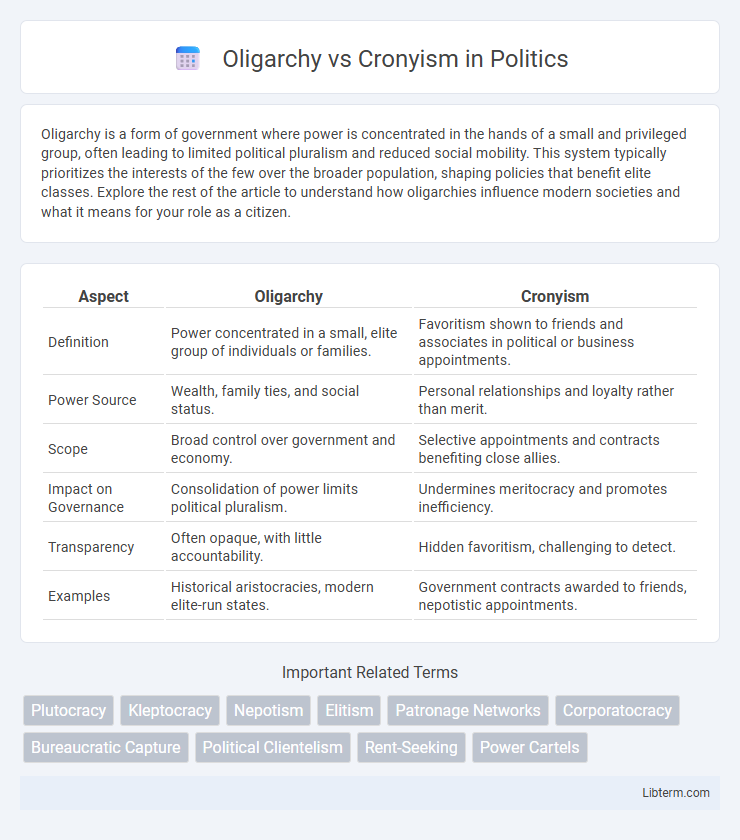Oligarchy is a form of government where power is concentrated in the hands of a small and privileged group, often leading to limited political pluralism and reduced social mobility. This system typically prioritizes the interests of the few over the broader population, shaping policies that benefit elite classes. Explore the rest of the article to understand how oligarchies influence modern societies and what it means for your role as a citizen.
Table of Comparison
| Aspect | Oligarchy | Cronyism |
|---|---|---|
| Definition | Power concentrated in a small, elite group of individuals or families. | Favoritism shown to friends and associates in political or business appointments. |
| Power Source | Wealth, family ties, and social status. | Personal relationships and loyalty rather than merit. |
| Scope | Broad control over government and economy. | Selective appointments and contracts benefiting close allies. |
| Impact on Governance | Consolidation of power limits political pluralism. | Undermines meritocracy and promotes inefficiency. |
| Transparency | Often opaque, with little accountability. | Hidden favoritism, challenging to detect. |
| Examples | Historical aristocracies, modern elite-run states. | Government contracts awarded to friends, nepotistic appointments. |
Understanding Oligarchy: Definition and Origins
Oligarchy is a form of power structure where a small group of individuals control a country or organization, often based on wealth, family ties, or military influence. Originating from the Greek term 'oligarkhia,' meaning 'rule by few,' this system has historically appeared in ancient city-states and modern political regimes. Understanding oligarchy involves recognizing its roots in concentrated authority and the exclusion of wider public participation in governance.
What Is Cronyism? A Brief Overview
Cronyism is the practice of favoring close friends, family members, or associates in political, business, or organizational appointments regardless of their qualifications. Unlike oligarchy, where power is held by a small, elite group based on wealth or influence, cronyism emphasizes personal relationships and loyalty over merit. This practice often leads to inefficiency, corruption, and undermines institutional integrity by prioritizing favoritism over objective decision-making.
Key Differences Between Oligarchy and Cronyism
Oligarchy is a form of governance where power is concentrated in the hands of a small, elite group, often based on wealth, family ties, or military control, whereas cronyism refers to the practice of favoring friends and associates in political appointments and business dealings regardless of merit. The key difference lies in the scope; oligarchy is a systemic structure of rule by a few, while cronyism is a corrupt practice that can exist within various political systems, including oligarchies. Power in oligarchies is maintained through institutional control, whereas cronyism undermines meritocracy by prioritizing loyalty and personal relationships.
How Oligarchies Form and Operate
Oligarchies form when a small group gains concentrated power through wealth, family ties, or political influence, often consolidating control over key resources and institutions. This elite group maintains authority by controlling decision-making processes, limiting competition, and suppressing dissent to protect their interests. Oligarchic systems typically operate through informal networks and patronage, enabling them to manipulate laws and economic policies for personal gain while maintaining a facade of legitimacy.
The Mechanics of Cronyism in Modern Societies
The mechanics of cronyism in modern societies involve the strategic allocation of government contracts, regulatory favors, and financial resources to close networks of political allies and business partners. This system undermines meritocratic principles by prioritizing loyalty and personal relationships over competence and fairness. Cronyism perpetuates economic inefficiencies and entrenches inequalities by concentrating wealth and power within elite circles, often masquerading under the guise of legitimate oligarchic governance.
Historical Examples: Oligarchy vs. Cronyism
Historical examples of oligarchy include the ancient Spartan society, where power was concentrated in the hands of a few elite warriors, and the Venetian Republic, governed by a narrow aristocratic class controlling political and economic decisions. In contrast, cronyism is exemplified by regimes like the Marcos administration in the Philippines, where political leaders favored friends and family in awarding government contracts and positions, undermining meritocracy and public trust. These examples highlight the difference between oligarchy's structured elite ruling class and cronyism's nepotistic favoritism within political and economic systems.
The Impact of Oligarchy on Governance and Economy
Oligarchy concentrates political power in the hands of a few, often resulting in policies that favor elite interests over the broader population, leading to unequal resource distribution and limited social mobility. This concentration of power can stifle competition, innovation, and economic diversity, creating barriers to entry for smaller businesses and hindering sustainable economic growth. Governance under oligarchic systems frequently suffers from reduced accountability and transparency, fostering corruption and undermining public trust in institutions.
Cronyism’s Influence on Policy and Business
Cronyism significantly shapes policy-making and business environments by prioritizing personal connections over merit and fairness, often leading to inefficient allocation of resources and favoritism in government contracts. This influence undermines competitive markets and distorts regulatory frameworks, enabling select businesses to gain unjust advantages through political favoritism. The entrenchment of cronyism in governance erodes public trust and hampers economic growth by fostering corruption and reducing transparency.
Oligarchy and Cronyism: Dangers to Democracy
Oligarchy, a system where power is concentrated in the hands of a few elite individuals or families, undermines democratic principles by limiting political competition and marginalizing the broader population. Cronyism, characterized by favoritism in political appointments and economic opportunities based on personal relationships rather than merit, corrodes institutional integrity and fosters corruption within democratic frameworks. Both oligarchy and cronyism erode public trust, weaken accountability, and destabilize democratic governance by prioritizing narrow interests over the collective good.
Combating Oligarchy and Cronyism: Solutions and Reforms
Combating oligarchy and cronyism requires transparent governance frameworks, stringent anti-corruption laws, and independent judicial oversight to ensure accountability. Strengthening democratic institutions through electoral reforms and promoting civic engagement can reduce elite capture and favoritism. Implementing merit-based public sector appointments and robust conflict-of-interest regulations fosters fairness and limits the concentration of power among privileged groups.
Oligarchy Infographic

 libterm.com
libterm.com